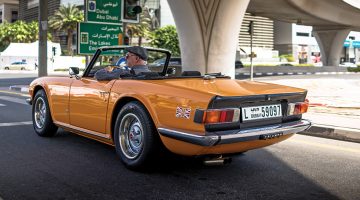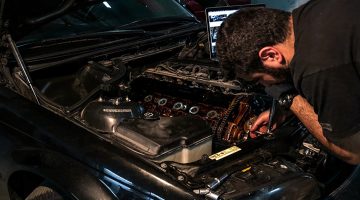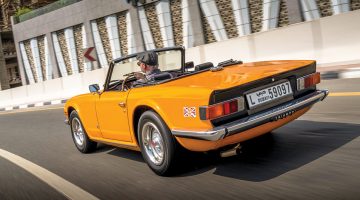Phill grabs forty winks in the Management Fleet Volkswagen Golf Mk 7.
[Not a valid template]Having been out of the country for three of the past four weeks, my time in the Golf has been limited this month. But nevertheless, I continue to find little details about the car that I like. This time around, it concerns the doors.
My one weekend in the Middle East was spent taking part in the second round of the Dubai Kartdrome Endurance Karting Championship – 600 laps of the circuit, which took just over 12 hours through Friday night and into Saturday morning.
I arrived at the circuit in the Golf on Friday afternoon, the boot filled with helmet, kit bag and a portable fan, and two large carpets rolled up and placed in the back seats. Have I previously mentioned that the Golf is practical? Further proof right there.
Anyway, I was one of the first to arrive and thus had a prime parking space virtually next to our pit garage. Later, I returned to the car to sleep during some down time and found the spaces either side of the VW taken up by other cars. The Mustang next to my driver’s door was annoyingly close.
Normally, this calls for an exercise in delicacy. Unlike many other motorists in the Middle East (so it seems), I prefer not to simply open the door into the flank of the car next to me, leaving a small but definite dent. My preferred technique is to open the door, wait for it to fall into one of the pre-defined ‘steps’ in the door track and then carefully, with my fingers wrapped round the edge, ease it towards the other door without it popping into its next step and walloping the neighbouring car. It’s a dangerous game, which easily results in either accidental damage to someone else’s car, or bruising to my fingers.
So imagine my delight when I realised that Volkswagen has cleverly engineered a door that simply stays at the point to which you open it. There are no stages for it to slip into, so placing it at the exact distance necessary to get in, without having to hold onto it, is now a doddle instead of a Twister-like exercise in advanced contortion.
I can also vouch for the fact that the Golf’s driver’s seat is an extremely comfortable place to sleep when fully reclined. I’m not sure whether that’s the kind of in-depth analysis of the car’s features that will benefit the majority of potential customers, but it’s true nonetheless.
We came seventh, by the way. Top five next time, hopefully.
| Volkswagen | Golf Mk7 | |
|---|---|---|
| Engine: | Inline 4cyl / 1395cc | |
| Power: | 138bhp @ 4500rpm | |
| Torque: | 184lb ft @ 1500-3500rpm | |
| Transmission: | Seven-speed direct shift gearbox (DSG) | |
| Front suspension: | McPherson struts with lower wishbones / anti-roll bars front and rear / ESP / TSC / electromechanical servotronic steering with speed-dependent power assistance | |
| Rear suspension: | Four-link suspension with separate spring shock absorber arrangement / anti-roll bars front and rear / ESP / TSC / electromechanical servotronic steering with speed-dependent power assistance | |
| Brakes: | Disc brakes front and rear, front discs ventilated / ABS / EBPD / dual brake assist / 288mm (front) / 272mm (rear) | |
| Wheels: | 6 1/2 J x 16 | |
| Tyres: | 205/55 R16 front and rear | |
| Weight (kerb) | 1288kg | |
| 0-100kph: | 8.4sec | |
| Top speed: | 212kph |



